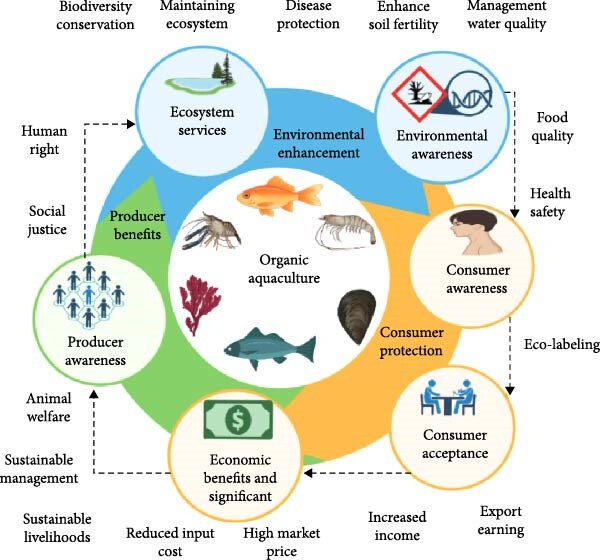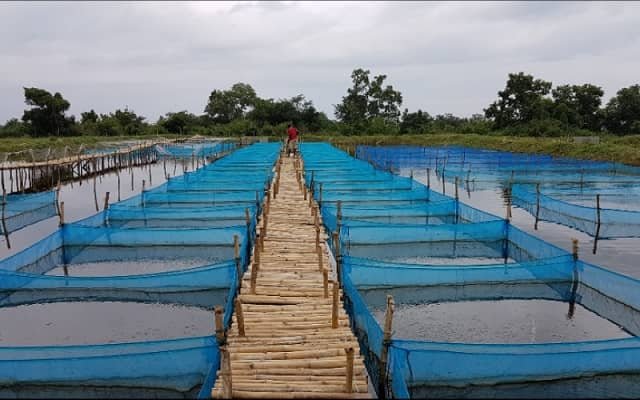
Global demand for seafood is increasing, and aquaculture is poised to play a key role in meeting this need. But, like agriculture, aquaculture needs to evolve to be sustainable in the long term. This is where organic aquaculture emerges as a promising solution.
Researchers from Ramnagar College, Chonnam National University, Kalinga Institute of Industrial Technology (KIIT) Deemed to be University, Dev Bhoomi Uttarakhand University, Marwadi University, and Cairo University published a scientific review analyzing various aspects of organic aquaculture, including organic guidelines, production methods, food quality, environmental impact, economic performance, as well as socioeconomic and marketing considerations.
What is Organic Aquaculture?
Unlike conventional aquaculture, which often relies on synthetic inputs and antibiotics, organic aquaculture prioritizes natural practices. By minimizing water pollution, conserving natural resources, and avoiding harmful chemicals, organic aquaculture contributes to a healthier ecosystem.
In this regard, organic aquaculture is a specific farming method that emphasizes environmentally friendly practices and minimizes the use of synthetic chemicals. Its goal is to produce fish and seafood free from synthetic pesticides, antibiotics, and growth hormones, ensuring a safer food product for consumers.
Why Organic Aquaculture?
Several factors drive the growth of organic aquaculture:
- Reduced environmental footprint: Organic practices minimize pollution from antibiotics, pesticides, and nutrient runoff, promoting healthier ecosystems.
- Meeting consumer demand: Consumers are increasingly seeking sustainable and healthy seafood options, and organic certification fills that gap.
- Competitive advantage: Organic certification can provide a competitive edge in the market, attracting premium prices.
A Comprehensive Look at Organic Aquaculture
The article published in the scientific journal Aquaculture Research delves into the key aspects of organic aquaculture, providing a holistic understanding of its potential and challenges:
- Regulations: Organic aquaculture is a relatively new field, and regulations are still evolving. Understanding these guidelines is crucial for producers seeking certification.
- Production methods: Organic aquaculture emphasizes natural feeds, sustainable stocking densities, and disease prevention through eco-friendly methods.
- Food quality: Studies suggest that organic fish may have higher levels of omega-3 fatty acids and be less susceptible to antibiotic residues.
- Economic viability: Organic production can be more expensive due to factors such as the cost of premium feeds. However, the potential for higher market prices could offset these expenses.
- Socioeconomic and marketing considerations: Raising consumer awareness and education about the principles of organic aquaculture is essential for its success.
Challenges of Going Organic
While organic aquaculture holds immense potential, there are challenges to address:
- Knowledge gap: Switching to organic production requires knowledge of specific methods and best practices.
- Regulatory landscape: Organic regulations for aquaculture vary globally, creating confusion for both producers and consumers.
- Economic feasibility: The costs of organic feeds and lower yields may impact profitability for certain species.
Organic Aquaculture: A Boon for Developing Countries?
The study suggests that organic aquaculture may be better suited for developing countries due to:
- Social benefits: Organic practices promote fair labor conditions and respect for producers’ rights.
- Market potential: Consumers in developed countries are often willing to pay a premium for organic fish and seafood products.
Conclusion
Organic aquaculture presents a compelling path toward a more sustainable and responsible seafood industry. While challenges remain, this approach offers numerous benefits for consumers, the environment, and even developing nations. As research progresses and consumer awareness grows, organic aquaculture could become the new standard for fish farming, ensuring a healthy future for our oceans and a sustainable supply of seafood for generations to come.
Stay Always Informed
Join our communities to instantly receive the most important news, reports, and analysis from the aquaculture industry.
Contact
Mirza Masum Beg
Department of Fisheries Science, Ramnagar College
Purba Medinipur, 721453, West Bengal, India
Email: beg.masum44@gmail.com
Reference (open access)
Beg, M. M., Roy, S. M., Ramesh, P., Moulick, S., Tiyasha, T., Bhagat, S. K., & Abdelrahman, H. A. (2024). Organic Aquaculture Regulation, Production, and Marketing: Current Status, Issues, and Future Prospects—A Systematic Review. Aquaculture Research, 2024(1), 5521188. https://doi.org/10.1155/2024/5521188
Editor at the digital magazine AquaHoy. He holds a degree in Aquaculture Biology from the National University of Santa (UNS) and a Master’s degree in Science and Innovation Management from the Polytechnic University of Valencia, with postgraduate diplomas in Business Innovation and Innovation Management. He possesses extensive experience in the aquaculture and fisheries sector, having led the Fisheries Innovation Unit of the National Program for Innovation in Fisheries and Aquaculture (PNIPA). He has served as a senior consultant in technology watch, an innovation project formulator and advisor, and a lecturer at UNS. He is a member of the Peruvian College of Biologists and was recognized by the World Aquaculture Society (WAS) in 2016 for his contribution to aquaculture.







